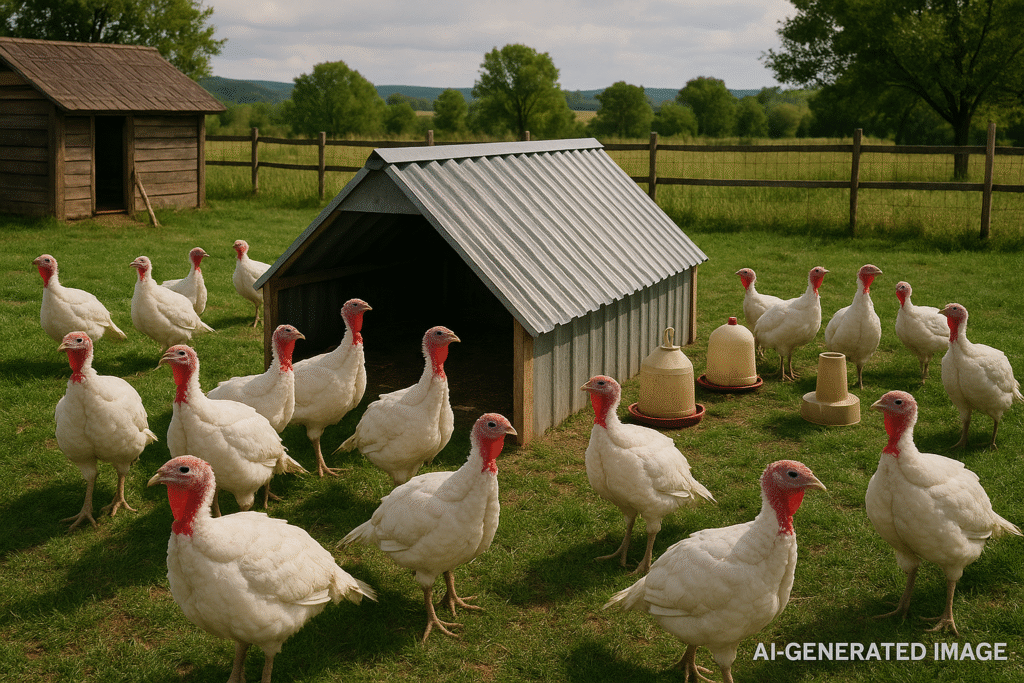
N.B. This photo is not real, it is an AI-generated one.
The Problem and Motivation Behind
“There’s this belief that young people can’t really do anything, especially in agriculture. But I was raised in a village, and I wanted to prove we can go back and build something meaningful.” – Giorgi.
Giorgi Mokverashvili (23-year-old) grew up in a village where most young people saw agriculture as outdated and unprofitable. Many left for the capital, believing that success could only be found in cities. But Giorgi felt differently. Deeply connected to his village, he saw potential where others saw limitation.
Rather than follow the path of migration, Giorgi chose to stay—and prove that agriculture could be modern, meaningful, and financially viable. “People think farming is not for young people. But I wanted to show that we can stay in our villages and build something of our own,” he said. Driven by this belief, he launched a small turkey farm. His motivation came from a desire to break stereotypes and build a future rooted in agriculture development.
The Innovative Solution
“I started raising turkeys for meat, and then expanded to eggs and small turkey chicks. I am learning more about the markets, about the diseases, and how to grow the business step by step. I am experimenting with new directions, even trying to deliver to Tbilisi.” – Giorgi.
With support from the Youth Innovation Lab, Giorgi launched a small turkey farm in his hometown. He applied a design-thinking mindset by starting with what was locally possible—raising turkeys for holiday meat sales—and iterating from there. As demand grew, so did his ambitions. He began producing turkey eggs and hatching poults (baby turkeys), using incubators, and exploring ways to reach new markets.
The farm became a living prototype. Giorgi learned through trial and error—testing hatch rates, improving feeding methods, and adjusting his business strategy based on customer needs. He received consistent feedback from mentors, which helped him refine his model. “The feedback I got during the lab sessions really helped me improve. They didn’t just say ‘well done’—they told me what could be better.”
In 2023, the farm raised about 200 turkeys, creating a modest but growing income for Giorgi. While this year’s (2024) yield was lower, Giorgi is building on learning from his errors to improve next season’s results. Meanwhile, the community interest and customer demand increased by time. People from neighbouring areas—and even from Tbilisi—began asking about his products.
Lessons Learned and Addressing Challenges
“That part of the lab i.e. learning how to speak about my idea and seek funding—was life-changing,” – Giorgi.
The Youth Innovation Lab provided Giorgi with a seed grand, training and mentorship support that enabled him to set up his turkey farm. He learned how to write a business plan, budget properly, and access funding. Additionally, the mentors guided him through legal and administrative processes to register his business and navigate financial planning—skills he initially lacked.
Reflecting on his experience, Giorgi identified two lessons learned:
Seeking support and sharing knowledge: One of the toughest moments came when the first batch of poults (baby turkeys) started dying unexpectedly. Giorgi had experience raising chickens, but turkeys were far more fragile. After days of incubating and caring for the eggs, the sudden losses were disheartening. He reached out to more experienced farmers and veterinarians, who advised him on feeding and disease prevention. “Raising baby turkeys is hard. We lost a lot in the beginning—they’re more sensitive than chickens. But we reached out, asked vets, and adapted. That’s how we got through it,” Giorgi explained. Through this challenge, Giorgi learned the value of knowledge-sharing and collaboration. “We learned not just by doing,” he said, “but by talking to others, asking questions, and applying what we learned right away.”
Next Steps and Future Aspirations
“We’re not just raising turkeys—we’re showing that youth can return to the village and do something real. I want to expand the farm, improve the quality, and inspire others.”
Looking ahead, Giorgi is focused on expanding production, improving the quality of his poultry, and securing more stable market links—especially with Tbilisi. He hopes to increase the number of turkeys, invest in better equipment, and eventually hire support, creating jobs for others. His deeper aspiration is to inspire youth in rural areas. “If young people like me go back to their villages and start something, we can change the story,” he said. “We don’t have to all move to cities. There is a future here if we make it.”
Already working as a project manager at a youth centre and a coordinator with a local foundation, Giorgi is using his platform to reach other young people with the message that rural innovation is possible. He believes in leading by example and showing that change doesn’t need to come from outside—it can begin with a small farm, a bold idea, and a commitment to stay rooted.